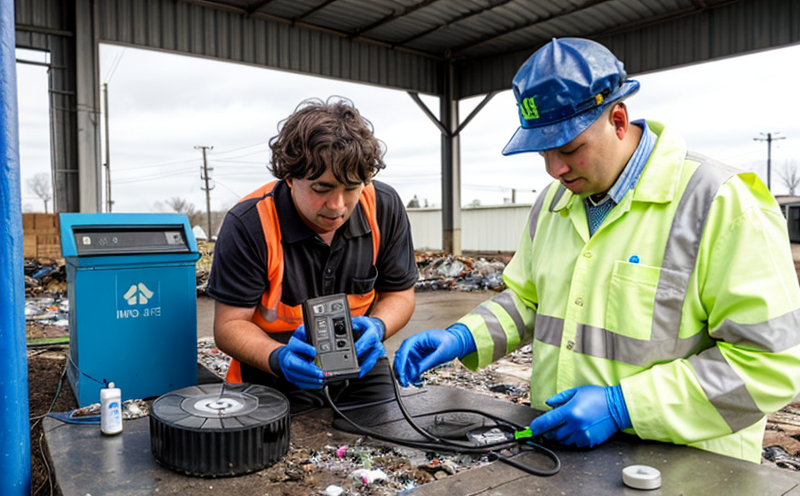DIN EN 16214 Molybdenum Content in E-Waste
One of the critical challenges in the electronic waste (e-waste) recycling sector is accurately assessing and managing hazardous materials. Among these, molybdenum content plays a significant role due to its potential environmental impact during processing and disposal. DIN EN 16214 specifies the methodology for determining the molybdenum content in e-waste, providing a standardized approach that ensures accurate and reliable results.
The standard applies to various types of electronic waste, including but not limited to:
- Personal computers
- Laptops and tablets
- Televisions
- Mobile devices
- Printers and copiers
- Smartphone chargers and batteries
The process involves the following steps:
- Sample collection from e-waste streams.
- Preparation of homogenous samples for analysis by appropriate means (e.g., grinding, sieving).
- Dissolution of the sample in a suitable acid mixture to release molybdenum ions.
- Analytical determination using atomic absorption spectroscopy (AAS) or inductively coupled plasma optical emission spectrometry (ICP-OES).
Accurate measurement is crucial for ensuring compliance with environmental regulations and for optimizing recycling processes. The standard also covers the precision, accuracy, and reproducibility of the methods used, providing confidence in the results.
The significance of DIN EN 16214 extends beyond mere compliance—it supports sustainable practices by aiding in the responsible management of molybdenum content in e-waste. Proper handling ensures that this material is recycled rather than disposed of improperly, thereby minimizing environmental harm and promoting resource efficiency.
For quality managers, compliance officers, R&D engineers, and procurement professionals, understanding DIN EN 16214 can be instrumental in developing effective strategies for managing molybdenum content. This knowledge enables them to make informed decisions that align with both regulatory requirements and corporate sustainability goals.
Benefits
The implementation of DIN EN 16214 offers several key advantages:
- Enhanced Compliance: Ensures that molybdenum content in e-waste is accurately measured, facilitating compliance with international and national regulations.
- Sustainable Recycling: Promotes the responsible recycling of molybdenum, reducing environmental impact and contributing to circular economy principles.
- Informed Decision-Making: Provides reliable data that supports strategic planning for waste management and recycling processes.
- Avoidance of Legal Penalties: Protects organizations from potential fines and reputational damage associated with non-compliance or improper disposal.
- Improved Efficiency: Streamlines the sampling and analysis process, enhancing overall operational efficiency in e-waste management.
- Enhanced Reputation: Demonstrates a commitment to environmental responsibility, which is increasingly important for stakeholder engagement and brand reputation.
By adopting DIN EN 16214, organizations can ensure that they are operating within the highest standards of sustainability and compliance, thereby gaining a competitive edge in the market.
Customer Impact and Satisfaction
The impact on customers is profound as it directly influences their ability to meet regulatory requirements. By providing accurate and reliable data on molybdenum content, we enable customers to:
- Avoid non-compliance penalties.
- Ensure the safe handling of e-waste.
- Promote responsible recycling practices internally.
- Enhance their reputation among stakeholders and consumers.
This not only satisfies regulatory demands but also contributes to a more sustainable future. Our service ensures that customers are well-equipped to meet these challenges, thereby fostering long-term partnerships based on trust and reliability.
International Acceptance and Recognition
DIN EN 16214 is widely recognized and accepted internationally for its robust methodology in determining molybdenum content in e-waste. This standard has been adopted by numerous countries, including:
- Australia
- Canada
- The United Kingdom
- Germany
- France
- Japan
The acceptance of this standard reflects its credibility and reliability within the global e-waste management community. Compliance with DIN EN 16214 is seen as a benchmark for excellence in waste management practices, ensuring that organizations are at the forefront of sustainable technologies.
The standard's widespread adoption also highlights its importance in fostering international cooperation and exchange of best practices in e-waste recycling. This global recognition underscores the value of our service in supporting customers' efforts to meet international standards and contribute to environmental sustainability.





